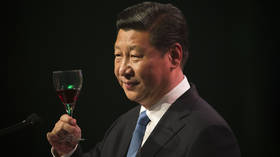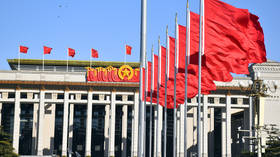Russia’s divorce from the West has pushed it into China’s arms. Here’s how it will work

First published in Russian on globalaffairs.ru
Russia’s military operation in Ukraine and the consequent economic embargo of Moscow by the West is the largest upheaval in world politics since at least the end of the Cold War. The result will be a complete reformatting of the country’s foreign economic relations and its economic model, as well as Russia and the US sinking into a protracted military-political confrontation in Eastern Europe.
Both factors will have a direct impact on the situation in East Asia amidst a gradually growing confrontation between China and Washington there. As a result of standing on the sidelines of the crisis and calling on the parties to show restraint, Beijing will be the only world center of power to benefit from the Ukrainian catastrophe in the long run. It is possible that the events in Ukraine will predestine China’s success in opposing the United States.
China’s position on the Ukrainian crisis
The Chinese position on the Ukrainian crisis was expressed to the fullest in a telephone conversation between its Foreign Minister Wang Yi and a number of his European colleagues. In brief, it boils down to five points:
- China believes it is necessary to protect and respect the sovereignty and territorial integrity of all countries.
- China stands for common, sustainable, comprehensive security. The security of some countries cannot be enhanced at the expense of others by strengthening or expanding military blocs. Given the five waves of NATO expansion, Russia’s legitimate security demands must be taken seriously and properly responded to.
- China is closely monitoring the situation in Ukraine and what is happening there is not what it would like to see. The parties must exercise restraint, avoid escalation, and prevent a humanitarian crisis and the death of civilians.
- China supports any diplomatic efforts that could lead to a peaceful solution of the Ukrainian crisis. China welcomes direct dialogue between Russia and Ukraine. The Ukrainian issue has a complex historical context. Ukraine should be a bridge between East and West, not a line of confrontation between great powers. China also supports EU-Russian dialogue on European security.
- The UN Security Council should play a constructive role in resolving the Ukrainian crisis and avoid actions that could exacerbate points of contention.
China has expressed its regret over the ongoing tragedy, and welcomes any negotiations leading to peace. This is the rhetoric traditionally heard from Beijing regarding conflicts and crises in which it is not involved. The Xi Jiping government has avoided condemning Russia, while leveling veiled criticism at the West for NATO expansion and its unwillingness to listen to Moscow’s security concerns.
Chinese officials are not calling Russia’s actions in Ukraine an ‘invasion’. Its state media does not publish materials that present Moscow and its president in a negative light. In the Chinese blogosphere, Vladimir Putin, as well as his actions and rhetoric connected with the Ukrainian operation, are met with wide approval by nationalist-minded people who draw parallels between this situation and China’s relationship with Taiwan.
Despite widespread speculation that Beijing, as Russia’s only remaining friendly major trading partner, could put pressure on Moscow to conclude a peace agreement as soon as possible, there is no indication that Beijing has even considered doing so.
China has taken a position of neutrality that is friendly to Russia concerning the conflict. Representatives of the country’s Foreign Ministry and the Chinese banking regulator have repeatedly stressed their intention to fully maintain relations with Russia despite the situation.
During the UN Security Council vote on the Ukrainian crisis China abstained, electing not to support the Russian veto. But it did the same during the Crimean crisis. In principle, China cannot recognize precedents that support changing the status of territories based on referendums (as happened in the Crimea, Lugansk and Donetsk Republics) since this will affect the Taiwan problem. It should also be noted that Russia does not recognize and does not support the Chinese position in its territorial dispute with India, or Chinese claims in the South China and East China Seas.
American statements about having ‘discussions’ with China about the situation surrounding Ukraine and even of China giving some consideration to Westent sanctions are divorced from reality. This is not the first time this situation has occurred. In 2014, President Barack Obama tried to convince the Chinese not to conclude an agreement with Russia on the construction of the Power of Siberia gas pipeline, which was nonetheless signed in May of the same year.
Economic cooperation
As in the previous stages of the Ukrainian crisis, Chinese companies and banks operating on the world market should take into account the possible negative impact of US and EU sanctions. In this respect, they do not differ from the businesses of any other country. However, the Chinese typically exhibit an acute fear of falling under punitive American measures, which leads them to a wide interpretation of sanctions.
Therefore, regardless of the position of the Chinese government, sanctions have always had a certain negative impact on Russian-Chinese cooperation. In addition, the shock effect from the disruption of usual payment mechanisms, production chains, and logistics in the coming months will inevitably manifest itself. Businesses will have to find new ways of operating.
At the same time, the parties have so far carried out significant work to put a secure infrastructure in place to ensure bilateral trade, and such efforts have continued until very recently. In 2020, the share of the ruble in bilateral trade reached 7 percent, and the yuan – 17 percent. China is striving to internationalize its currency, and it can now be used for settlements between non-residents of the country.
Preparing for a tough conflict with the West, Russia has sharply increased the share of yuan in its gold and foreign exchange reserves. According to some estimates, the Bank of Russia has $140 billion worth of Chinese government bonds denominated in yuan alone. Indirectly, this may also indicate that the current volume of sanctions has been expected for a long time.
In addition, China’s CFETS trading system and the Moscow Exchange have been trading in the yuan-ruble currency pair since 2010. Thus, conditions exist for all trade between the two countries to be shifted to national currencies, mainly to the yuan, due to the volatility of the ruble.
In 2020 and 2021, China’s share of Russian trade was about 18 percent. Beijing is Moscow’s largest nation state trading partner, although the EU as a whole takes a bigger share. It was about 38 percent in 2020. Since 1999, the China’s share has been steadily rising, while the EU’s has been gradually falling since the second half of the 2000s.
If this trend were to continue, one would expect the levels of the China and the EU in Russian trade to be roughly equal in the early-mid 2030s. However, with the EU’s embargo of Russian imports, the process of reorienting to China may slightly accelerate, and China could become Russia’s main trading partner within the next two or three years. As a result, the trade between Russia and its main trading partner will be safe from external influences.
A sharp increase in Russian raw material exports to China may be constrained by lack of appropriate infrastructure, including the capacity of railways, pipelines, and port terminals. China exports mainly finished goods, which are less dependent on transport capacity.
Consequently, in the next free years, we should expect a sharp increase in Chinese exports to Russia with a more modest increase in Russian exports to China. There may be a significant imbalance in favor of Beijing in Russian-Chinese trade for some time.
In this context, the early accumulation of huge yuan reserves indicates that Russia’s authorities have been preparing for something resembling the current configuration of economic sanctions.
Beijing’s promotion to the role of the sole or main buyer of some types of Russian products and trade in exchange for yuan is likely to mean some price losses for Russian exporters. But, under the current difficult conditions, this can hardly be considered critical. With the development of new logistics, China may eventually replace the European market.
The importance of redirecting exports to China means development of the requisite infrastructure in the Far East will need to be accelerated. Given the importance of speed, it will probably have to be built with the involvement of Chinese investment and companies. Construction projects like this can give important impetus to development in the Russian regions.
The issue of expediting the conclusion of contracts for this construction will also arise, as well as the question of completing the Soyuz Vostok gas pipeline (a continuation of the Power of Siberia – 2), which taps into the same raw material base as the pipelines to Western Europe, ahead of schedule.
China may have significant interest in redirecting Russian raw material exports to itself while converting it to yuan, as this will not only give Beijing numerous political and strategic benefits, but also bring it huge economic gains. In particular, China’s protection from sanctions and embargo attempts will sharply increase, the cost of acquired resources will decrease, while the role of the yuan in world trade will dramatically rise (the internationalization of the yuan is an important goal for Chinese policy).
Russia’s earlier attempts to diversify its economic ties with Asia can be considered dead after the region’s three most developed economies (Japan, South Korea, and Singapore) supported anti-Russian sanctions to varying degrees, albeit under severe pressure from the United States.
China will inevitably become the dominant partner, and it is possible that, in the near future, its share in Russian trade will be comparable to the peak values of the EU’s share at one time (more than 50 percent).
A positive point for Russia is the growth in the number of Chinese companies that have fallen under various kinds of American sanctions which occupy strong positions in mechanical engineering, information and communication technologies, and the aerospace industry. This increase in pressure from US sanctions began in 2020, and there is reason to expect that this will only grow. Sanctioned Chinese companies will not need to fear the costs of working with Russia.
Chinese partners, including those under sanctions, are capable of occupying places in many important segments of the Russian market formerly held by European and American companies. This is, first of all, in the sale and production of cars, consumer electronics, and industrial equipment in Russia. In many areas, the Chinese are quite capable of replacing Western suppliers – sometimes with a moderate loss of quality, and sometimes without.
An important area where the Chinese cannot be useful to us as of yet, where they are experiencing problems similar to ours, is the aviation industry. China, like Russia, depends on imported equipment. As in Russia, its own civil aviation programs (ARJ21, C919) are dependent on Western components and vulnerable to sanctions pressure that is already being exerted. Strengthening cooperation in replacing Western civil aircraft is an urgent issue.
Prospects for political relations
In order to somehow curb economic dependence on China, Russia will have to use the few tools at its disposal to diversify foreign trade. Nevertheless, it is obvious that, while it is facing an economic blockade by the West, Russia will have no choice but to increasingly expand political and military cooperation with Beijing.
The importance for China of Russia’s resource, technological, economic, and military potential amidst confrontation with the United States will allow Russia to avoid sinking into a clearly subordinate position in this partnership. But China will set the tone, nonetheless.
The real political goal will be to preserve the ability to restore Russia’s ‘strategic autonomy’ with a possible weakening of the embargo in the long term.
Moscow has not been involved in many disputes between Asian powers, and its policy towards Asia has been independent from China’s, except for that of generally containing the influence of the United States. Now Russia will have to protect its ties with independent players, in particular with India and Vietnam, while sacrificing its relations with US allies in the Indo-Pacific region, primarily Japan and Australia, for the sake of strengthening its partnership with China.
The negative trend that has recently emerged in Russian-Japanese relations will sharply intensify. Events like the joint patrol of Russian and Chinese fleets around Japan that took place at the end of 2021 will continue. There may be a question of coordinating the two countries’ positions in territorial disputes with Tokyo (Chinese claims to the Diaoyu /Senkaku Islands and the problem of Russia’s southern Kuril Islands).
As it moves to more actively promote its global initiatives and concepts of world order (Community of Common Destiny, relations between great powers in a new era, the Belt and Road initiative), China may be interested in attracting proactive support from major countries, and it is likely to receive such backing from Russia. Actually, this was already manifested in a joint Russian-Chinese declaration following Vladimir Putin’s visit to China on February 4, 2022.
China probably can’t radically ease the shock of the first months or year of the embargo for Russia – everything will depend on Russian economic policy here. In the long term, Russia’s partnership with China, along with its own industrial policy, will become the basis of a new model for Russian economic development. And, in some respects, a healthier foundation than its previous partnership with the EU. China is less attractive to the elite as a place to extract capital and then permanently relocate, and it has a more rational and predictable system for economic decision-making. Finally, the Chinese economy will grow faster than Europe’s in the foreseeable future, as well as its market demand.
China will replace the EU as our main trading partner, and a gradual reversal of trade flows to the East may become a factor in the development of Siberia and the Far East, right down to the relocation of part of the population there from the European part of the country. The negative impact of Western sanctions on Russian-Chinese cooperation will gradually weaken as China itself is drawn into the sanctions confrontation with the West. Another important factor in this will be trading in yuan.
With a rational policy, Russia can come out of the Western embargo significantly strengthened, with more diversified foreign trade and better developed export infrastructure in the Far East, as well as more balanced foreign relations that are more resistant to sanctions.
The price for this will be the undermining of the policy Moscow had been pursuing for many years to diversify its ties with Asia. Russia will be forced to act in line with China’s Asian policy not only to contain the United States, but also to confront US allies led by Japan. The negative impact of its partnership with China on relations with India and Vietnam can be minimized as long as these countries remain independent players, not unduly beholden to the United States, and, thus, do not become priority targets for Chinese pressure.
The question of forming a military alliance with Beijing will most likely not arise in the near future. But hypothetically, it is still impossible to exclude the emergence of a formal Russian-Chinese military alliance, or situational military interaction in the event of military crises in the Pacific. Or, for example, appeals to article 9 of the Russian-Chinese Treaty on Good Neighborliness, Friendship and Cooperation of 2001. This article stipulates that, in the case of a threat to one of the parties, urgent consultations are to be held to eliminate such a threat. This is quite a realistic prospect in the event of a crisis concerning Taiwan, when Beijing will be interested in Russia’s ‘nuclear umbrella’ to prevent American intervention.
















